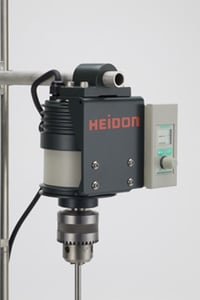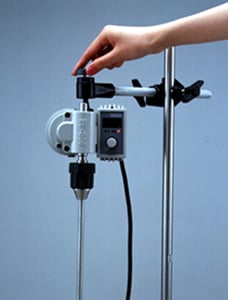 Laboratory mixing requires exact measurements and precise attention to detail. Mixers are an integral part of a scientific “test kitchen” where all kinds of products are developed and tested as they prepare for production on a larger scale. Laboratory mixers are used in a range of settings in the development of a whole array of goods, including:
Laboratory mixing requires exact measurements and precise attention to detail. Mixers are an integral part of a scientific “test kitchen” where all kinds of products are developed and tested as they prepare for production on a larger scale. Laboratory mixers are used in a range of settings in the development of a whole array of goods, including:
- Polymers and plastics
- Pharmaceuticals
- Pulp and paper
- Chemicals
- Cosmetics
- And so much more
The results achieved in these lab settings provide a wealth of information about the further development of these products, which significantly influence many aspects of our lives. As a result, the mixers must provide accurate, reliable, and repeatable results.
Just as important is the safety of these instruments, their longevity, and that they serve you well for their intended purpose.
How can you evaluate potential mixers to live up to these standards? Each new instrument is an investment in your organization and its people. You want to protect the people using these instruments and see that your investment pays for itself with years and years of use, deftly handling all of your mixing needs.
Here’s what you need to know about finding a laboratory mixer that’s up to your expectations, keeps you and your employees safe, and lasts for years.
Considerations and Questions to Ask When Selecting a Laboratory Mixer
Instruments like laboratory stirrers and mixers must be able to deliver repeatable and precise results, which is why they have been carefully engineered to handle various applications. Some professionals may require a magnetic stirrer with a rotating magnetic field to move a stir bar within the liquid mixture, and others may need heated or non-heated platforms.
Because there are so many different applications, here are some questions to ask yourself as you evaluate which laboratory mixer is right for you. According to Lab Manager, these are as follows:
- What sample volumes will your mixer need to handle?
- What are your intended applications?
- Will you need a magnetic stirrer, as is the case for applications with low-shear mixing?
- What is the viscosity of the samples you will be mixing? Highly viscous samples may create an excess of resistance that a magnetic stirrer can’t handle.
- What are the various mixing speeds you will need?
- Do you need a heated platform?
- What kind of vessels will you use? Note that overhead stirrers can be used with flat-bottomed vessels and round-bottomed flasks in closed reaction systems.
- Are you selecting a mixer with a digital display for speed and torque?
- Does your instrument have a timer display?
- What kind of motor is used? Is it susceptible to overheating?
- Are the speed and torque settings well-suited to your intended use?
Other considerations may be for the features you want your mixer to have, including thermal motor protection, torque measurement, auto-reversing, keyless chucks, programmable settings, reciprocating agitators, steady mixing speeds, and additional attachments.
Safety & Longevity: Selecting a Mixer to Keep You Protected for the Long Haul
Safety should be among your top priorities when choosing from the highest-quality mixers available. Why? Because many laboratory mixers on the market today have motors that generate sparks as they operate. When paired with harsh chemicals or volatile mixtures that many labs handle, this can quickly start a fire.
At Kett, all of our laboratory mixers are equipped with “three-one brushless motors”. Without the friction that many laboratory mixers create during operation, our motors have been engineered to prevent sparking, reducing the culminating fires that can happen as a result of sparking.
For added safety, all of our motors are completely encased. This keeps particles, liquids, dust, and even air from entering the motor, causing problems, or starting a fire.
These encased motors have an added benefit regarding the lifespan of your laboratory mixer. These particles can wear away at the motor’s components, limiting its power and shortening its lifespan. Eventually, these particles can cause a motor to short out, overheat, or stop working entirely. However, with an enclosed motor, the elements remain untouched and function as intended, extending the life and improving the safety of the motor.
At Kett, we also take pride in offering laboratory-quality instruments that hold up to decades of heavy use no matter where you are. Some of our instruments have weathered 30 to 40+ years of use. We don’t believe in “planned obsolescence” or engineering instruments meant to fail in order to gain a profit. We’re here to provide the best quality, long-lasting instruments needed to power your operations.
Kett: Where Safety, Satisfaction, and Endurance Meet
At Kett, we know that when you choose a laboratory mixer with us, you’re putting a great deal of faith in our team to provide you with the best possible instruments. And we don’t take that responsibility lightly. We value safety, performance, and longevity above all else, but the customer is at the heart of those values.
Let us help you find the right laboratory mixing system from our carefully engineered and thoughtfully curated selection of laboratory mixing systems, including our high-performance Kett Heidon Z+ series of mixers, created to meet a wide range of needs. We’ll listen attentively to your needs and point you in the right direction so you end up with a mixer that’s perfectly suited to you.
Are you ready to discuss which laboratory mixer is the right fit for you? Contact us today!


